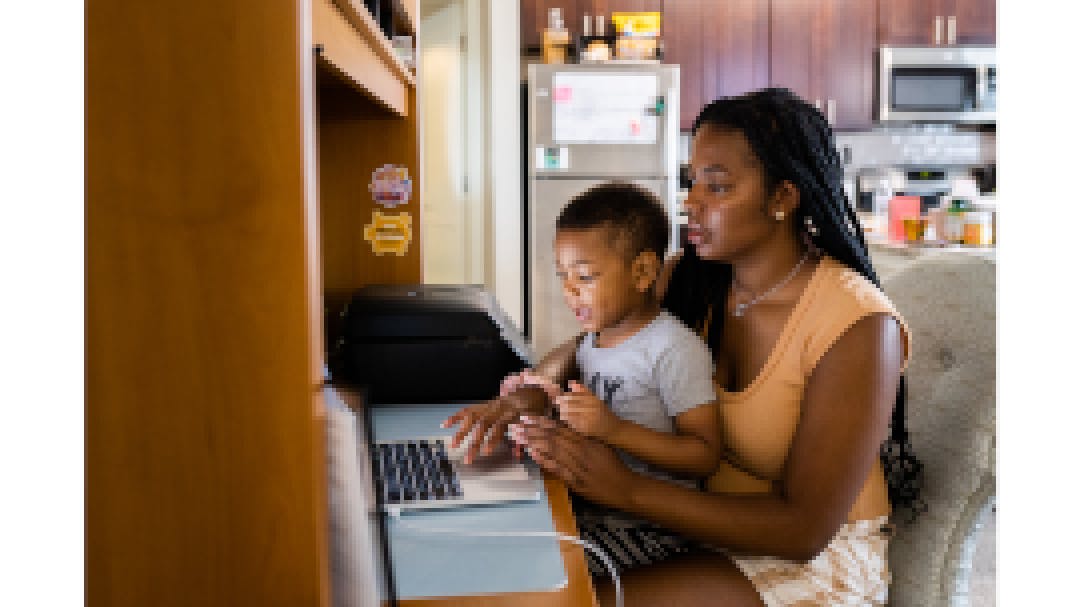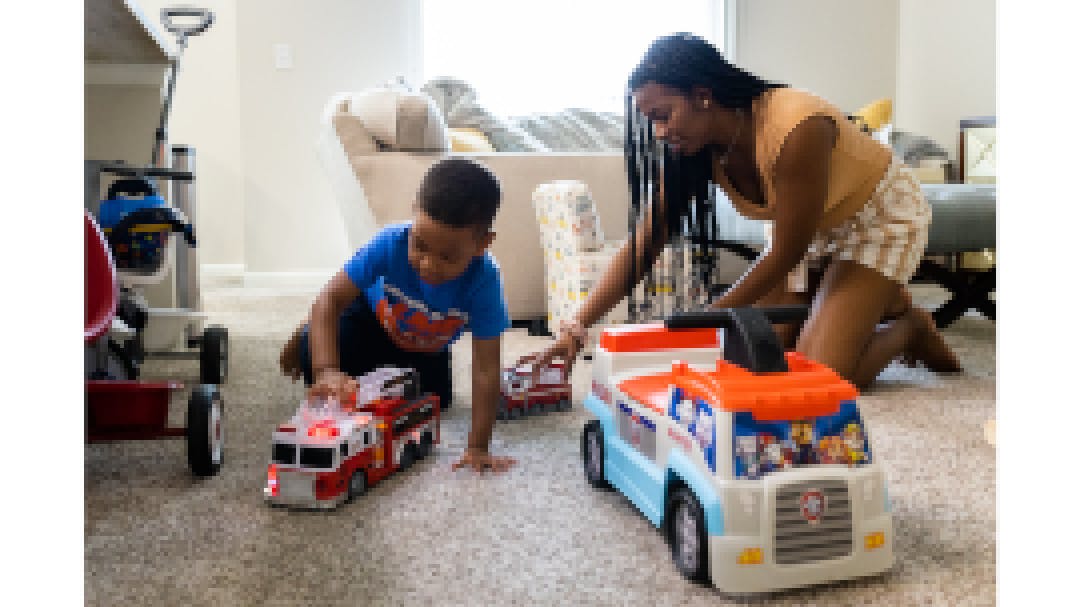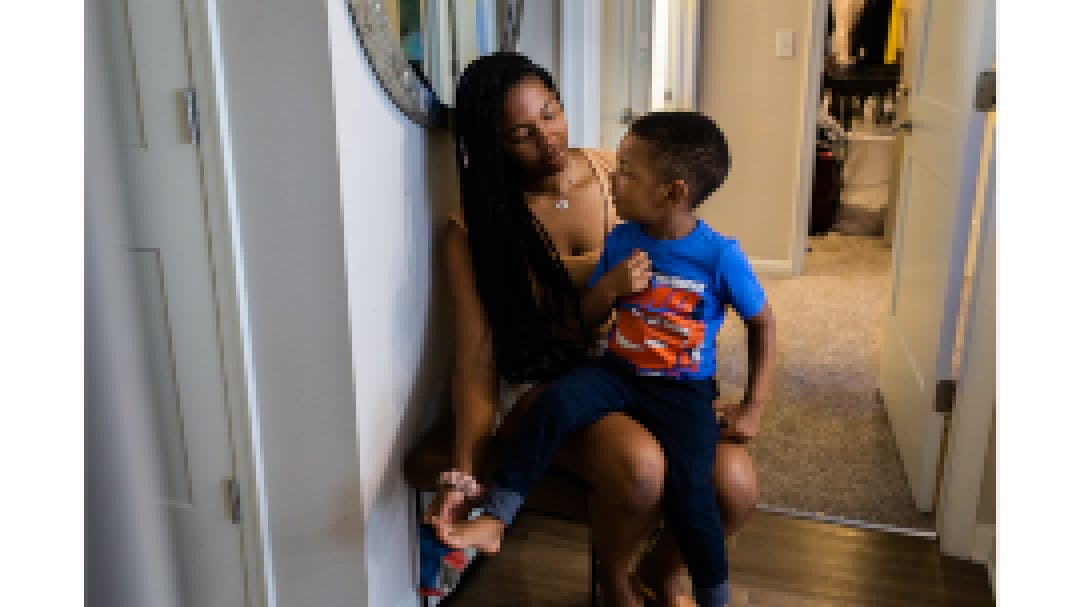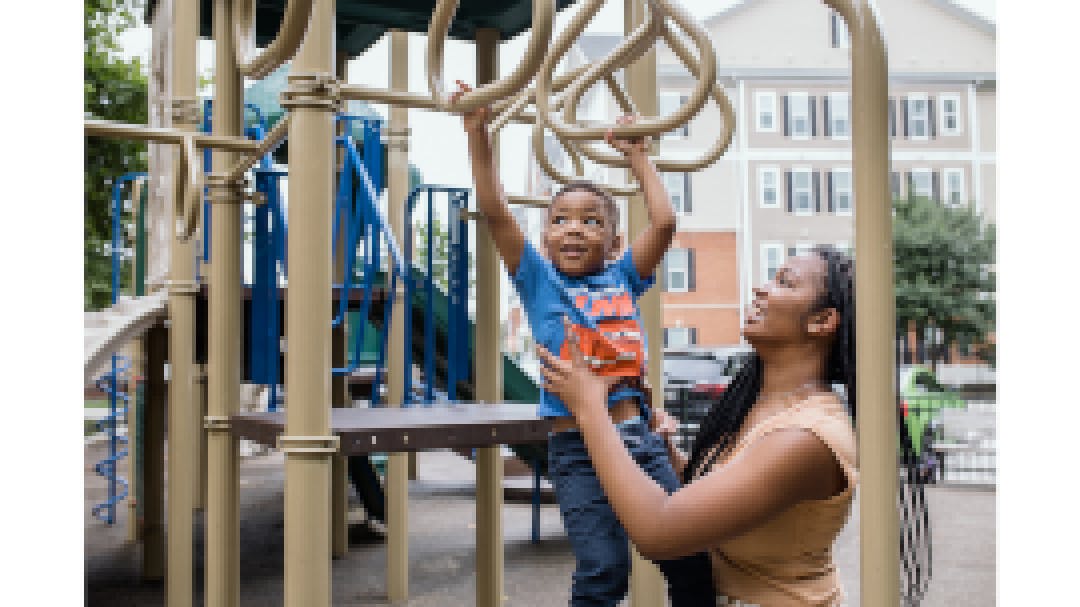
BALTIMORE — Sarah Turner moves with grace. At 8:45 on a Thursday morning in May, the 20-year-old stands at the stove, preparing two meals at once: eggs for her son Noah’s breakfast and a grilled cheese sandwich for his lunch.
Noah sits expectantly at the dining room table. The 3-year-old boy—about as tall as his mother’s hips—plays with a toy piano keyboard, then arranges his collection of toy cars and trucks into a formidable line of traffic. When Sarah delivers his plate of eggs, sausage and grapes, he eats while pretending to soar through the air.
“Noah’s on the airplane,” he declares, wobbling on his chair. “Woahhh!”
Noah’s lunchbox lies open on the counter, next to a freshly made Mother’s Day card. Earlier this morning, Sarah and Noah retrieved the box from Sarah’s mother’s house a short drive away. Now it’s filled with strawberries, peaches and curled cheese puffs—Noah calls these crunchy snacks “rainbows.” Sarah slides in a grilled cheese sandwich to complete the meal.
She’s not cooking for herself this morning. She’ll grab breakfast later on campus, in between her college classes and club meetings. Lunch, too.
The apartment where Sarah and Noah live has two of everything: his and hers. In the closet, tiny blue Toy Story clogs rest beside women’s UGG boots. In the living room, a miniature armchair printed with automobiles nestles into an adult-sized furniture set. Two tidy desks stand side by side. On the smaller one: a package of “mess-free” paper and markers, tiny squirt guns and an empty container of dinosaur counters. On the large one: a collection of reminders written on colorful cards, a printer and a stack of books: “The Fire Next Time,” “The New Jim Crow,” and “How Europe Underdeveloped Africa.”
A name card printed with the logo of the University of Maryland, Baltimore County, also sits atop the large desk. It reads: “Sarah Turner, Ph.D.”
That’s Sarah’s future. The calendar on the refrigerator marks the upcoming milestones on her journey to get there. One day left to plan a big ceremony for her college mentorship organization. Five days left until the final class of her junior year. Seventeen days left until her 21st birthday.
The rest of the apartment reflects Sarah’s present. There’s Noah’s bathroom, where he is learning—slowly—to potty train. There’s Noah’s bedroom, marked by a sign that reads “Little Man Cave.” There’s the room across the hall that’s reserved for Sarah’s aunt, her father’s sister, whom she calls Aunt Leslie.
Leslie Turner visits often from Florida. She supports Sarah with wisdom, finances and guidance on navigating college and raising her son. She gives Sarah advice and encouragement so often that some of it has condensed into code phrases.
“We’d always talk about, ‘Sarah, you need to be your best self,’” Aunt Leslie recalls. “I’d drop her off and say ‘best self!’ and she would say, ‘I know, I know, best self.’”
What Sarah’s best self means is changing. Back in high school, when Sarah was on the track and field team, her aunt liked to remind her that she was a student-athlete—emphasis on the student.
“Now it’s not the student-athlete,” Aunt Leslie says. “It’s the mom-student—emphasis on the mom.”
Sarah has two big goals for the summer. The first: to fully potty train Noah, using a three-day regimen, no distractions allowed. The second: to make the most of a 10-week residential research program at Harvard, alone, leaving Noah with family, first Aunt Leslie and then Sarah’s mother, Chantal Turner.
Sarah tries to ensure that Noah’s life is “predictable and stable,” she says. “My job is to keep him low-stress,” she adds. She knows the summer separation could put that at risk. This is the kind of compromise that a mom-student who dreams of success must consider carefully.
“I want to be a great role model, but I want him to have an active mom in his life,” Sarah says. “Is it worth being away?”
With Harvard on the horizon, Sarah savors each morning with Noah, knowing there won’t be many left like this one. Noah takes a few spins on his red Radio Flyer tricycle. Sarah reminds him to use his “listening ears.” She helps him slip on his giraffe backpack and ushers him out the door on his way to preschool. In the hall, Noah pushes the elevator buttons to take them to the ground floor. Buckled into the back seat of the car, Noah chats with Sarah about the teachers he will see today. He points out his grandmother’s house when they drive past it.
In the parking lot of his preschool, Noah affixes a small mask to his face. He strides confidently into his classroom, where other small children are eating snacks, pausing just briefly to turn around and wave goodbye to Mommy.
If no unforeseen force topples the carefully balanced time blocks of Sarah’s schedule, it will be seven hours until she hears that name again. The intervening time is hers—to study, to work and to learn from the adults she has sought out to help her best self emerge.
It goes by fast. “My days start out like this,” Sarah says, undulating her hand in a relaxed wave, “and then”—her fingers snap.
With the clock ticking, Sarah climbs back into the driver’s seat and points her car toward campus.












